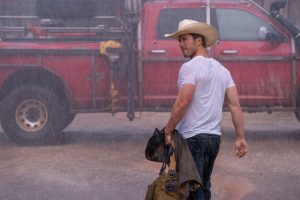Reviews include Deadpool & Wolverine, Doubles, and Mountain Queen: The Summits of Lhakpa Sherpa.
TFCA Friday: Week of August 5
August 5, 2022

Welcome to TFCA Friday, a weekly round-up of film reviews and articles by TFCA members.
In Release this Week
Alma’s Rainbow (dir. Ayoka Chenzira, 1994; Aug. 7)
“Chenzira, now in her late sixties, has been busy as a professor, producer, experimental filmmaker, animator, and television director,” notes Liam Lacey in a look at the release of the restored film at Original Cin. “It’s impossible to look at these films without thinking of all the potential films from Black women filmmakers that were made, though the absence adds to the significance of those few that exist.”
The Art of Making It (dir. Kelcey Edwards)
“The Art of Making It tackles the increasingly volatile business of art with a healthy palette of piss and vinegar,” writes Pat Mullen at POV Magazine. “The lucrative commodification of contemporary art, for example, or the seemingly diminished value of discerning taste might fuel other docs. Those topics are merely starting points, however, for Edwards’ incisive study of a growing catastrophe that examines a crisis from all angles.”
Buba (dir. Arne Feldhusen)
At Afro Toronto, Gilbert Seah calls it a “film that leads nowhere and drags slowly towards its unwitting and welcome end.”
Bullet Train (dir. David Leitch)
“The inimitable Mr. Pitt, who doesn’t get nearly enough credit for his comic timing and physical humour, hasn’t had this much fun since he played the mumbling thug in Guy Ritchie’s Snatch, one of the many blood-and-banter films that Bullet Train resembles,” writes Peter Howell at the Toronto Star. “Here Pitt sends up his superstar status by playing Ladybug, a flaky international spy and assassin in a bucket hat and black-rimmed glasses who is in the midst of re-evaluating his life.”
“[A]ction comedy that moves along with such breakneck speed that one can hardly follow the script – not that it matters,” admits Gilbert Seah at Afro Toronto.
“A history of Canadian mass transit would likely contain more fun, humour and excitement than the lumbering, overbooked carriage that is Bullet Train,” sighs Chris Knight at the National Post. “Mind you, it wouldn’t contain Brad Pitt, who is easily the best thing in this busy movie, though his presence helps cement the feeling that this is both a Guy Ritchie knockoff (squabbling, eccentric British assassins with rough-and-tumble accents, played by Aaron Taylor-Johnson and Brian Tyree Henry) and a Quentin Tarantino knockoff, an Asian fusion of blood and vengeance.”
“In real time and in slaughter-filled flashbacks, blood spurts, people are shot, decapitated and poisoned (if your eyes bleed, you’ve been poisoned). In between, there are a couple of extraneous celebrity cameos meant mainly to get a reaction from the audience,” says Jim Slotek at Original Cin. “It’s a mess of a plot and a literal trainwreck of a denouement. No faulting the destruction scenes, since they’re in Leitch’s wheelhouse, and as they say, every dollar is on the screen in that regard. But to paraphrase a quote from the late character actor Edmund Gwenn, killing is easy, comedy is hard.”
I Love My Dad (dir. James Morosini)
“I Love My Dad is definitely a raunchy, gross-out comedy – you don’t want to watch Oswalt’s character making out with his own son in a fantasy sequence, but you also can’t look away,” admits Chris Knight at the National Post. “But it’s got a lot of charm, much of it in the person of Morosini, who carries himself with a goofy, young-Tobey-McGuire vibe. He also wrote the dialogue for “Becca,” who gamely delivers it, complete with typos, auto-corrects and acronyms. LOL.”
“I Love My Dad is a creepy, cringey number based on real events in which a dad, Chuck (Patton Oswalt) decides to deceive his way into healing a long-festering wound in his relationship with his son,” notes Anne Brodie at What She Said. “Weird stuff happens as Franklin has sexual thoughts about Becca and relays them to ‘her,’ ‘she’ answers and soon enough Franklin and ‘dad’ are kissing onscreen in a dream sequence.”
“Advertised as a dark comedy, I Love My Dad works less than a dark comedy than a father/son relationship drama with a few funny moments,” writes Gilbert Seah at Afro Toronto. “They are too few laughs and the ‘uncomfortable’ comedy borders on the point of disturbing.”
“What works as edgy comedy is determined by what you can get away with. Having introduced depression and virtual incest, I Love My Dad just isn’t adroit enough to find a credible happy ending escape hatch,” notes Liam Lacey at Original Cin. “Too much of Chuck’s conduct is too calculating to come across as fumbling and misjudged, and instead seems sadistic, punishing his mentally fragile son, who had rejected him, for a crushing disappointment. The festival awards aside, audiences are likely to be less tolerant of Chuck’s behaviour than the forgiving filmmaker would like us to be.”
Luck (dir. Peggy Holmes)
“Jane Fonda is a beneficent Dragon who runs her happy-go-lucky land until a threat appears in the form of a bad luck curse. All the inhabitants must band together to battle the bad to save the day and help Hazel find a home,” notes Anne Brodie at What She Said. “It’s colourful, noisy, rambunctious, and funny, so this is a warning for light and sound-sensitive viewers. My favourite part is Sam’s unbreakable spirit against the odds and the idea that fortitude and love will get us through.”
A Night of Knowing Nothing (dir. Payal Kapadia; Aug. 11)
“Why are romance and rebellion such a compelling marriage?” asks Pat Mullen at POV Magazine. “A Night of Knowing Nothing imagines the relationship of L and K as Kapadia draws upon a series of letters allegedly found in a cupboard. Sweet nothings and poetic ramblings yield to urgent reflections about women’s rights, sexual violence, and the war for democracy itself. A Night of Knowing Nothing is a bold and energizing portrait of personal and political awakening.”
Preman: Silent Fury (dir. Randolph Zaini)
“Entertaining enough martial-arts action flick made more interesting by its Indonesian gangster setting and deaf hero gangster,” writes Gilbert Seah at Afro Toronto.
Prey (dir. Dan Trachtenberg)
“It’s great to see a young female protagonist as a proactive, brave, and intuitive heroine as is the case in Prey,” writes Anne Brodie at What She Said. “This is a fresh and exciting standalone film that entertains, educates, and fires the imagination and admiration for [Amber] Midthunder’s dedication.
“There is enough right and apparently painstakingly accurate about Prey – the Predator series prequel in which the now-familiar species of extraterrestrial hunters sets sights on a tribe of 18th Century Comanches – that hearing the characters speak an actual indigenous language would have taken it to a whole other level. Instead they speak jarringly modern English,” writes Jim Slotek at Original Cin. “Yes, there is a “Comanche dub”…But how much more authentic would it have been for everybody to hear Comanche? It wouldn’t be as if you’re asking people to read a book at the bottom of the screen.”
Thirteen Lives (dir. Ron Howard)
“Howard’s deep skill and empathy raise the film from an ‘adventure action’ film to a think piece, a true and harrowing but measured interpretation,” writes Anne Brodie at What She Said. “Howard has covered natural disasters previously and his reliably human, empathetic, and intelligent approach makes this an extraordinary experience.”
“Of course, the Hollywood heavyweights do most of the heavy lifting, with Farrell and Mortensen nicely paired as the optimist and the realist, respectively,” says Chris Knight at the National Post. “And mention must be made of composer Benjamin Wallfisch (Blade Runner 2049, It), whose score bravely underplays every emotional beat, allowing the film’s wonderfully ragged sound design to come to the fore – all that sloshing and clanking as the suited divers make their way through the dark, craggy caves.”
“The ultimate question is which one is the better film or rather which one would reveal a more accurate account,” says Gilbert Seah at Afro Toronto. “The answer is the documentary, which is more difficult to make and put together. Howard’s version has the unfair advantage to look at the doc and improve on it, which it did in terms of cinematography and the actual rescue.”
“The pace of Thirteen Lives accelerates as Thai cinematographer Sayombhu Mukdeeprom (Call Me By Your Name, Memoria) takes us from the pastoral football field to the bustling village to the torch-lit underwater caves,” says Liam Lacey at Original Cin. “Howard’s well-intentioned effort to create a panoramic and inclusive picture comes at a cost, particularly in the depth of characterization. One is left feeling that, though the film runs almost two-and-a-half hours, it barely scratches several surfaces.”
“When Howard focuses on the head-scratching mechanics of the mission itself, Thirteen Lives excels – and its many claustrophobic underwater scenes likely play excellently inside the confines of a darkened theatre,” writes Barry Hertz at The Globe and Mail. “But by the time we’re in pure rescue mode, it is almost too late. What should be the highest of high-stakes dramas arrives with a drippy thud.”
“For audiences who have experienced Jimmy Chin and Elizabeth Chai Vasarhelyi tautly crafted documentary The Rescue, Thirteen Lives doesn’t really add to the story, aside from some sexed-up casting choices,” writes Pat Mullen at That Shelf. “It’s sort of a classic anything drama can do, documentary does better situation. As a standalone work, the film is solid no-frills based-on-a-true-story drama from Hollywood’s top metteur en scène. If The Rescue was a daring-do by documentary adventurers, Thirteen Lives is dad cinema in top form.”
Wedding Season (dir.Tom Dey)
“Plenty of complications and predictability in this idealised tale of modernity and tradition that holds the possibility that maybe one’s parents are right occasionally,” admits Anne Brodie at What She Said. “P.S. Asha’s father is played by Schitt’s Creek’s wonderful Rizwan Manji.”
https://www.youtube.com/watch?v=RJ8vKfzewuk
What Josiah Saw (dir. Vincent Grashaw)
“[A] slow burn, moody and atmospheric psychological horror thriller that [makes] one work for one’s entertainment,” notes Gilbert Seah at Afro Toronto.
A Festival of Festival Coverage: TIFF Steps Up Platform
At the Toronto Star, Peter Howell reports on the announcement of TIFF’s Platform competition. “Platform selections in previous years have included the eventual Oscar Best Picture winner Moonlight as well as a Best Actress nomination for Natalie Portman (Jackie) and Best Actor nomination for Riz Ahmed (Sound of Metal). It was also here where rising star Florence Pugh first gained wide appreciation for her acting, in the 2016 film Lady Macbeth.”
At That Shelf, Pat Mullen looks at the Canadian films in TIFF’s competition: “Riceboy Sleeps is already garnering strong word of mouth buzz as one of the Canadian films to watch at the festival,” writes Mullen. “The TIFF Platform slot for Viking, meanwhile, is an overdue boost for Lafleur. The director previously delivered the laugh-out-loud coming-of-age comedy Tu dors Nicole, an offbeat black-and-white tale of a young woman growing up in dreary Quebec.”
https://youtu.be/-xjKgOnf1w4
TV Talk/Streaming Scribbles: Of Dogs and Bears
At The Globe and Mail, Johanna Schneller surveys the field of streamers and Canadian content, or “Canadian” content, as the industry faces potential changes if Bill C-11 passes and subjects the streamers to the same regulations that broadcasters face: “But the streamers are here to stay, and Canadian creators are going to work for them,” writes Schneller. “So whether or not Bill C-11 passes, the big question is, will the streamers commit to dedicated funds for Canadian content, to preserve a homegrown industry that was so hard-won and so painstakingly regulated?
At Maclean’s, Kelly Boutsalis profiles Reservation Dogs’ breakout Paulina Alexis: “Alexis soon landed a role in Beans, an acclaimed 2020 drama from Mohawk filmmaker Tracey Deer [which won the Rogers Best Canadian Film Award from the TFCA this year]. Six months later, she caught wind of an upcoming series about four teens on an Oklahoma reserve,” writes Boutsalis. “Alexis initially auditioned for Elora Danan, the show’s female lead, but the showrunners thought she was better suited to play the wily Willie Jack—a role originally written for a male actor. In true Canadian form, she found out she got the part while watching a hockey game. ‘I started freaking out in the stands,’ she says.”
At Exclaim!, Rachel Ho tucks in with The Bear: “The authenticity of The Bear has a lot to do with Canada’s own Matty Matheson. The former executive chef at Toronto’s beloved Parts & Labour (RIP), Matheson is well known for his YouTube channel and segments with Vice. Not only did Matheson provide some checks and balances along with other restaurant worker consultants, he actually has a supporting role in the show — hilariously as the restaurant’s handy man who is constantly reminded he’s not a part of the kitchen.”
At What She Said, Anne Brodie reports that the Prince of Wales will crown a winner as the judge of the reality series The Prince’s Master Crafters: The Next Generation: “Prince Charles will name the winner from six amateur British craftspeople – a wood carver, blacksmith, stone carver, pargetter, stained glass artist; and weaver – whose skills have been passed down for hundreds of years.” Meanwhile, there’s lots to admire in the return of Reservation Dogs: “the writing is top level, elevating the ordinary, taking the mickey out of bad choices and reflecting the heart and soul of this tight-knit community like any other and also unlike any other. What a treat.” She also agrees that The Bear is a dish worth digging into: “The complexity of the characters crammed into a small space is phenomenal. Each is defined and full – this is a rare treat of a series that must be savoured.”



